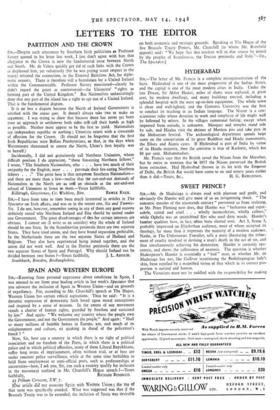SPAIN AND WESTERN EUROPE
Sut,—Knowing from personal experience about conditions in Spain, I was amazed to see from your leading article in last week's Spectator that you advocate the inclusion of Spain in Western Union—and on grounds of expediency. For, according to Mr. Churchill's speech at The Hague, Western Union has certain ethical aspirations. Thus he said: " It is a dynamic expression of democratic faith based upon moral conceptions and inspired by a sense of mission. In the centre of our movement stands a charter of human rights, guarded by freedom and sustained by law." And again: " We welcome any country where the people own the Government, and not the Government the people." And again: " Shall so many millions of humble homes in Europe, aye, and much of its enlightenment and culture, sit quaking in dread of the policeman's knock ? "
Now, Sir, how can a country in which there is no right of political association and no freedom of the Press, in which there is a political police and in which political offenders, many of them Liberal Republicans, suffer long terms of imprisonment, often without trial, or at best are under constant police surveillance, while at the same time forbidden to hold State employment or semi-official posts, such as professorships at universities—how, I ask you, Sir, can such a country qualify for inclusion in the movement outlined in Ivir. Churchill's Hague speech ?—Yours
23 Pelham Crescent, S.W. 7.
[Our article did not associate Spain with Western Union ; the use of that term was specifically avoided. What was suggested was that if the Brussels Treaty was to be extended, the inclusion of Spain was desirable
on both economic and strategic grounds. Speaking at The Hague of the five Brussels Treaty Powers, Mr. Churchill (to whom Mr. Rumbold appeals) said: " We hope that this nucleus will in due course be joined by the peoples of Scandinavia, the Iberian peninsula and Italy."—ED., The Spectator.]






























 Previous page
Previous page